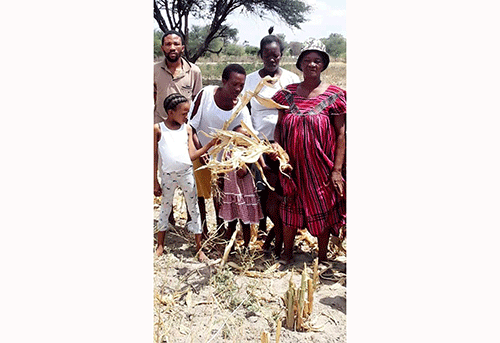Zebaldt Ngaruka
Water scarcity in the Tsumkwe constituency continues to prevent crop farmers in the area from producing sufficient food for household consumption and selling to locals for possible profit generation.
The prolonged drought situation has made it even worse for most farmers in the settlement, who have since abandoned large-scale crop farming, and have now turned to backyard gardens as a source of sustenance.
One of the farmers, Ngungas Kapembe, who is also the head of the San Farmers Association (SFA) in the Tsumkwe area, shared with AgriToday that a lack of sustainable access to water is not only hindering agricultural productivity, but also impacting the overall livelihoods of the communities.
He added that their dependency on government feeding programmes alone will not help them in the long run, hence the need for assistance to revive their crop fields.
“It is good that our government is giving us food, but the tractor mechanism and water provisions must be deployed to assist us here in Tsumkwe, at least to have enough water to help ourselves like our counterparts in other settlements,” said Kapembe.
The SFA leader also stated that agriculture is a source of income for farmers in the area, and thus the government should assist farmers in producing their own food and accessing markets.
This publication also spoke to Tsumkwe youth representative Matamo Khaled Kambila about the current drought situation in the locality, and how it has affected their projects.
Kambila, who is one of the crop farmers in the settlement, said water is indeed the major obstacle to many farmers in the constituency, but they are trying their best to thrive despite the challenges.
“Our settlement received poor rainfall, like most parts of the country. Drought persists here; it is posing significant challenges for agriculture, water supply and ecosystem health,” explained the youth representative.
He added that farmers are bearing the brunt of the crisis, experiencing reduced yields, financial losses and uncertainty about the upcoming harvest season.
“This directly impacts daily survival through food shortages and economic instability in a year that we think might be another difficult one,” he said.
On what should be done for the community and farmers to survive the current crisis and cope with poor rainfall figures, he said communities can explore alternative means of survival such as small backyard gardens and other related ventures.
“Alternatives such as rainwater harvesting, adopting water-efficient farming techniques like mulching and contour ploughing, seeking other income opportunities, and prioritising drought-tolerant crops and livestock breeds will be ideal at this point,” advised the young crop farmer.
Although there are policies in place to support farmers through subsidies during droughts, it seems the farmers in the settlement lack information and understanding thereof.
The youth leader said some people are aware and managed to purchase items through that programme, but many missed out on the opportunity.
“Some did benefit, but some are still facing difficulties with the transportation of goods to their respective settlements. The high prices of items are also questionable, although the government is assisting us with purchasing at the shops,” added Kambila.
Amongst others, he recommended that government provides financial assistance for crop and livestock losses, invest in water infrastructure projects, and promote sustainable land management practices to mitigate the impacts of future droughts.
Additionally, the youth leader called on the government to raise awareness about water conservation, and encourage community involvement in drought preparedness efforts, which are crucial steps towards building resilience in the face of water scarcity.
-zngaruka@yahoo.com



